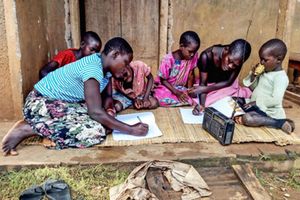
Patrick Jaramogi
Teenage pregnancies in Uganda represent a profound crisis, with more than 1,000 new cases reported daily, revealing a troubling public health and socio-economic issue.
According to data from the Ministry of Health, teenage pregnancies are not just a statistic but a reality with severe consequences. These include heightened health risks, including complications during childbirth and increased mortality rates among young mothers. Additionally, the social repercussions are equally grim, encompassing higher rates of school dropout, poverty, and mental health challenges.
The 2021 UNFPA report underscores the gravity of the situation, revealing that a quarter of girls aged 15-19 in Uganda are either pregnant or already mothers. This alarming rate is compounded by early marriages, with 34 percent of girls married by the age of 18, and 28 percent of maternal deaths occurring among young women aged 15-25.
In 2021 alone, there were 32,566 new pregnancies each month among teenagers, a staggering figure that reflects a broader societal issue.
Teenage pregnancies interrupt education, perpetuate cycles of poverty, and often leave young mothers grappling with the dual burdens of raising a child and coping with socio-economic hardships.
Addressing teenage pregnancies requires a comprehensive, multi-sectoral approach. Comprehensive Sexuality Education (CSE) has emerged as one of the most effective strategies. CSE provides crucial information about contraception, reproductive health, and healthy relationships, empowering teenagers to make informed decisions. This education helps reduce unintended pregnancies by ensuring young people are well-informed about the risks and responsibilities of sexual activity.
Access to affordable and confidential contraception is another critical component. Studies have shown that when teenagers have reliable access to contraceptives, the rates of unintended pregnancies decline significantly. Successful initiatives have included providing free contraceptives in schools and integrating contraceptive education into health services.
Community-based approaches also play a vital role. Local leaders and organisations can implement tailored programmes that address specific community needs. These might include youth empowerment initiatives, health workshops, and family counseling services, all aimed at fostering supportive environments and encouraging healthy decision-making among teenagers.
The personal stories of young mothers like one called Faith, who became pregnant at 14 and had to drop out of school, highlight the urgent need for intervention. Such narratives are a stark reminder of the personal toll of teenage pregnancies and the systemic issues that exacerbate the problem. In rural areas, where poverty and limited access to services prevail, the situation is even more dire, necessitating targeted interventions.
Efforts to combat teenage pregnancies are underway, with the Ministry of Health setting ambitious targets to reduce the rate from 24 percent to below 15 percent in the next five years. Strategies include increased advocacy, enhanced educational campaigns, and improved access to reproductive health services. However, more needs to be done.
Legislative efforts to increase funding for sexual health education and improve access to services are crucial. Moreover, addressing resistance from religious and cultural leaders is necessary for creating a supportive environment for these interventions.
As strategies evolve and more innovative solutions are explored, the goal remains clear: to reduce teenage pregnancies and ensure a healthier future for Uganda’s young mothers and their children.
Patrick Jaramogi is a multi media investigative journalist and media consultant. [email protected]




